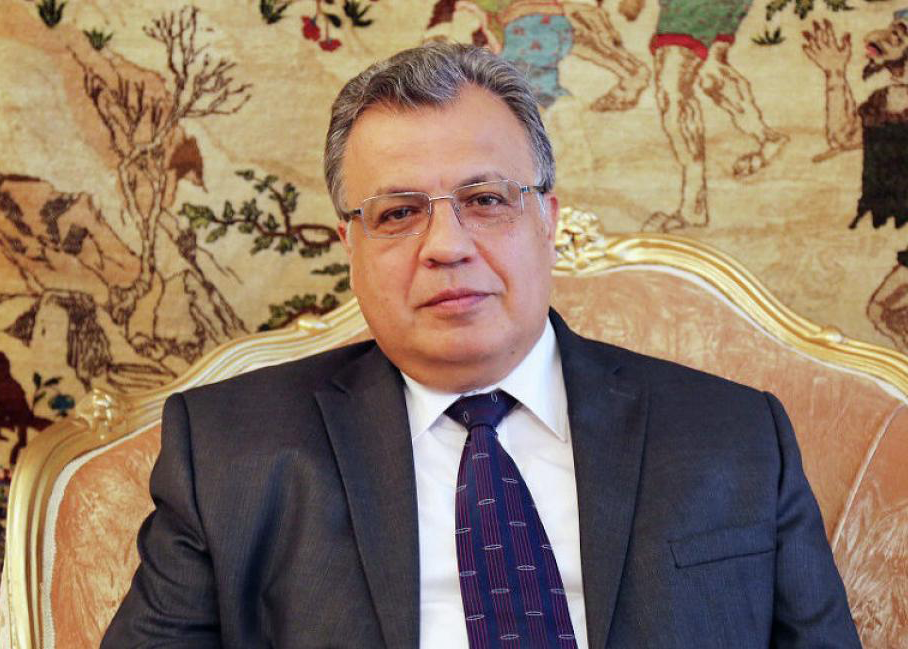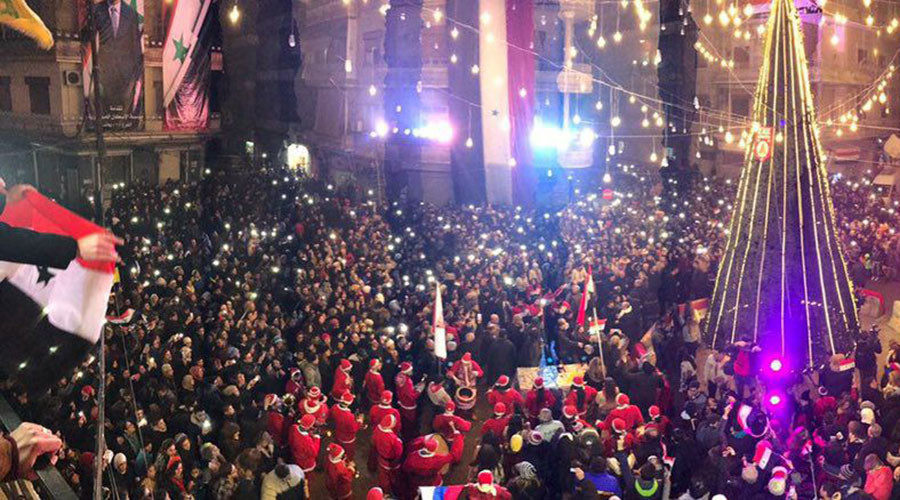West grief-stricken at Aleppo’s liberation
Empowering Weak & OppressedYusuf Dhia-Allah
Rabi' al-Thani 03, 1438 2017-01-01
News & Analysis
by Yusuf Dhia-Allah (News & Analysis, Crescent International Vol. 45, No. 11, Rabi' al-Thani, 1438)
Didn’t the Western rulers and their media tell us that they are opposed to the takfiri terrorists? So why are they so grief-stricken at the terrorists’ defeat in Aleppo?
What should have been celebrated universally — the liberation of Aleppo from the clutches of takfiri terrorists — has caused immense grief for Western rulers and their slavish corporate media. After four years, the takfiri terrorists have been driven out of eastern Aleppo but in the West it is being presented as a catastrophe. Screaming headlines like “Aleppo falls,” and “Slaughter of civilians” have been the staple of newspapers and television news coverage.
How can Western, especially American officials, be so detached from reality, or are they? Is it not a fact that their propaganda is aimed at camouflaging their complicity in supporting the terrorists all along? Now that they stand exposed, they are trying to impose a false narrative on their largely ignorant public that does not care much anyway about what happens to people in distant lands.
What happened in Aleppo and how it happened need to be recounted accurately. The eastern part of the second largest city of Syria, and its commercial hub, was in the grip of takfiri terrorists since 2012. In the western part that constituted the bulk of the ancient city, life continued normally or as normal as could be in a wartime situation. Schools, colleges, the university, shops and businesses remained open. People went about their lives even if the takfiris lobbed shells their way regularly.
In the eastern part under the takfiris’ control, all schools and colleges were closed. Even entry into hospitals was tightly controlled because the takfiris blackmailed people to extort money if they wanted treatment. People were forbidden from leaving the city and whatever aid was delivered through intermittent agreements, the takfiris took it away and hoarded it for themselves. While the UN, Western officials, and media frequently talked up the plight of people in eastern Aleppo, accusing the Syrian government of “starving” them into submission, Lebanon’s al-Mayadeen reported finding warehouses bursting with grain that the takfiris had hoarded for themselves. For the record, al-Mayadeen reporters were and are on the ground in eastern Aleppo, unlike any other media outlets or even the UN.
Eastern Aleppo’s liberation came after the Syrian army, backed by Hizbullah fighters as well as volunteers from Iran and other places, tightened the city’s siege. Russian and Syrian bombing raids against terrorist hideouts softened the city for its eventual liberation forcing the takfiris to flee.
The deal to allow the takfiris and their families to leave eastern Aleppo was worked out between Russia and Turkey on December 13. Others, notably the US and its regional puppets — Saudi Arabia, Qatar, etc. — were pointedly kept out. It appears even Iran was not fully in the picture although it was probably informed that Moscow and Ankara are working on a plan to allow the evacuation.
Tehran insisted that the takfiris allow a reciprocal evacuation of the besieged people in al-Fu‘ah and Kifraya villages in Idlib province. This explains why the convoys from eastern Aleppo did not leave on the day they were supposed to because the takfiris refused to abide by the agreement. They also threatened civilians fleeing toward government-held areas in western Aleppo. The takfiris warned they would attack any convoys and civilians that dared use the corridors set up for this purpose. And they made good on their threats.
The takfiris attacked and set fire to buses that were sent to evacuate civilians from al-Fu‘ah and Kifraya in Idlib province. The Western media that worked itself into lather over “concern”for civilians in eastern Aleppo seldom if ever mentioned the civilians in al-Fu‘ah and Kifraya. The selective outrage of the Western corporate media and Western officials exposed their true opportunistic spin of what was really going on. For them, the civilians of eastern Aleppo were mere pawns in their cynical game. The civilians besieged and trapped by the terrorists in al-Fu‘ah and Kifraya were of no concern because their plight did not fit into the narrative of projecting Russia and Syria in bad light. Instead, the terrorists that the West was allegedly fighting would be exposed as the real criminals.
Eastern Aleppo’s liberation led to celebrations in the streets, again much to the chagrin of the West. Western media outlets did not report these celebrations and if any did, these were played down or presented as stage-managed. Further, that tens of thousands of people from eastern Aleppo happily went to the western side to rejoin their families, from whom they had been separated for nearly four years, was also not reported. At the same time, other families from western Aleppo started to move into the newly liberated eastern part to see what had happened to their homes.
Aleppo’s liberation has clearly and decisively shifted the balance of power in favor of the government of President Bashar al-Asad of Syria. To say that he feels elated at the Aleppo victory would be an understatement. Al-Asad spoke philosophically after the liberation of Syria’s second largest city.
“What happened in Aleppo can be described as follows: time and history are linked, but people don’t remember time, they remember history. And time turns into history when the great events around the world decide to turn time into history.” He drew parallels with the record of history before the birth of Jesus Christ (a) and after. Similarly, he mentioned history in the context of before the revelation to the Prophet (pbuh) and after, and he spoke of Aleppo in a similar vein. He said, “I think that after the liberation of Aleppo, we will talk about the situation in Syria and in the world as different before the liberation of Aleppo, and after its liberation. Here, time turned into history. Aleppo turned time into history — that is, the people of Aleppo by their resistance, the Syrian Arab Army by its courage and sacrifices, and all the Syrian citizens who stood by Aleppo, their country and homeland, all those that stood by truth.”
To many it will sound hyperbolic — it is — but al-Asad can be forgiven for feeling elated at such a resounding victory because it does turn the tide of war imposed on Syria for nearly six years.
The other clear winners are Russia, Iran, and Hizbullah whose sacrifices saved another country in the region from falling into the hands of terrorist gangs as happened in Iraq and Libya. Iraq is gradually being clawed back from the clutches of the takfiris but it is a slow process. The takfiris are well dug in Mosul, Iraq’s second largest city that has been under their control since June 2014.
To show that Russia and Iran are now in the driving seat, a meeting between the foreign ministers of the two countries plus their Turkish counterpart took place in Moscow on December 20. The three countries’ defence ministers held separate meetings to coordinate future defence strategy for Syria. Turkish President Recep Tayip Erdogan is now resigned to the fact that he can no longer dictate who should rule in Syria. His frequent demands echoing Western and Saudi propaganda that “al-Asad must go” have been abandoned.
Years of negative propaganda against Syria and Russia, however, have poisoned enough minds in Turkey leading to the assassination of Russia’s ambassador Andrey Karlov in Ankara on December 19. The attacker was an off duty anti-riot policeman who screamed, “This is in revenge for Aleppo,” before shooting the Russian diplomat. The assailant was identified as 22-year-old Mevlut Mert Altintas. Turkey’s Special Forces, who stormed the Art Gallery where the Russian ambassador was speaking, killed the shooter. The following day (December 20), Turkey announced that the attacker was a member of the Gulenist cult and that six people had been arrested in connection with the assassination that Russia denounced as a terrorist act.
Was Altintas a Gulenist? We will never know for sure; after all, dead men don’t speak. The allegation, however, appears to be an attempt to deflect attention from the real culprits behind the assassination. Russian President Vladimir Putin also said in a televised address on December 20 that it was necessary to find out the “real hand behind the attacker.” Some commentators have suggested US/NATO powers wanted to exact revenge for their failure in Aleppo where their plan has suffered serious setback.

Many independent commentators have asked why the Syrian government agreed to allow the terrorists to leave Aleppo since the Syrian army would have to fight them again wherever they escape to. Two reasons appear to have been at work. First, Russia played a role in convincing the Syrian government to let them go since fighting them street-to-street and house-to-house would result in more civilian casualties. Damascus, too, wanted to show that its army was not made up of bloodthirsty killers as the West had projected all along. Instead, al-Asad is keen on reconciliation. He has already demonstrated this by accepting many terrorists that decided to lay down their arms and return to normal life. Such a policy carries risks but al-Asad feels that perhaps it may be worth it.
In any case, his army now controls most of the urban centres while the takfiri terrorists are confined largely to the countryside. He can afford to leave them there since most activity takes place in the major cities. This also seemed to be the intent of the Moscow declaration drawn up by Russian Defense Minister Sergei Shoigu at a meeting on December 20 with his Iranian and Turkish counterparts, Brigadier General Hossein Dehqan and Fikri Isik, respectively. “Today experts are working on the text of the Moscow declaration on immediate steps toward resolving the Syrian crisis. This is a thorough, extremely necessary document,” Shoigu said, adding that the text was aimed at achieving a durable ceasefire in Syria. All earlier efforts, especially by the US and its allies failed because “none of them wielded real influence over the situation on the ground,” he added. The Russian defense minister further stressed that Tehran and Ankara’s approval of Moscow’s document shows “readiness to guarantee and jointly address concrete questions related to resolving [the crisis in] Syria.”

In a related development foreign ministers of the three countries also announced their joint guarantee of peace talks in Syria as well as the expansion of ceasefire throughout the country and free access to humanitarian aid. Russian Foreign Minister Sergei Lavrov announced this at a Moscow press conference flanked by Iranian Foreign Ministers Mohammad Javad Zarif and Turkish Foreign Minister Mevlut Cavusoglu, respectively. “Iran, Russia, and Turkey are ready to assist in preparing the agreement in the making between the Syrian government and the opposition and to become its guarantor,” Lavrov said. “Right now, the evacuation is wrapping up,” he said, voicing hope that the process would finish in a maximum of two days.
The US and its allies, however, are not giving up yet. They pushed a resolution through the UN Security Council on December 19, presented by France, to send international observers to Aleppo to “monitor” the evacuation of civilians. While both Syria and Iran condemned the resolution, Damascus nonetheless agreed to allow 20 additional monitors.
The tide, however, has turned decisively against the terrorists and their foreign sponsors. This cannot be a bad development in an otherwise bleak situation in Syria.

